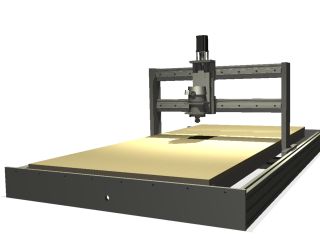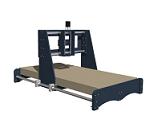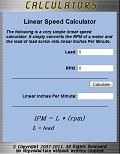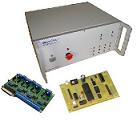The Builder's Guide
"Your homemade CNC router project begins here"
This guide is still under construction!
Sections
Introduction
My Experience
About Kits and Plans
About This Guide
The Guide Starts Here

Introduction
So you've decided to build a homemade CNC router or maybe youre just considering it, but where do you start? There are many advantages to owning a CNC router. Homemade CNC routers can cut and carve almost anything. For any hobbyist or DIYer, this opens many doors. The fact that you could own one for a fraction of the retail cost is even more enticing. Yes, you can build a CNC router that is just about as good as any other for a fraction of the retail price, and its not that difficult! This is not a sales pitch, this guide is FREE its all below. There is also a great deal of flexibility when you design and build your own machine. You will be able to customize your machine to fit you needs best. Not to big, not to small, just right. There are many reasons people want to build their own homemade CNC router. Its usually because we simply cant afford to buy one off the shelf and thats as good of a reason as any other. Or you may be like me and enjoy working with your hand and creating something unique. You might simply be in it for the learning experience. For me personally, I think it was a little of both.
My Experience
When I first started to design and build my first homemade CNC router, I had it all figured out in about a day. I had my design ready to go. Then as I started to buy the parts, I did a little research. I found bits and pieces of information here and there, but it just lead to more questions.
Do I really need ball screws or will ACME screws work fine?
What kind of linear bearing is the best, and can I afford it?
How big of a motor do I need, and should I use steppers or servos?
Will this material flex too much over that span?
Etc.
Luckily, some of my questions I could answer with my mechanical engineering background. However, many of the problems I would encounter could not be calculated. I just needed someone with experience and information on the subject. So I researched the internet. The information available is scattered and hard to come by, and how do I know if its valid. Most of the answers to my questions came through reading hundreds and hundreds of threads like CNCzone.com. Which is a rood resource. I would post my questions and wait for people who already have built a homemade CNC router to hopefully give me a good answer. Of course I would get many answers to my questions from different people, many of which contradicted each other. Then Id have to read though a thread where people were bickering back and forth. Of course then I would have to research further to find out which answers were worth while and which ones were garbage. Every time I had a question that I didnt know, I would have to go through the same process. A lot of this was due to the fact I was on a budget and wanted the best design my money could buy. Which is the same situation many people building a homemade CNC router are in? CNC router kits and plans
Yes, there are homemade CNC router kits available, but I have yet to see one that gives any explanation as to what you are actually doing. It just says do these things and you are supposed to follow directions. But what if you do not have the parts available? Or you want your design to vary slightly. Then you are left to fend for your self. Maybe you dont want to design your own, but still want to build your own. Thats where the kits and plans help you most, like the CNC router kits at www.solsylva.com . Plans are good for what they are, they are instructions. There are a lot of them out there and how do you know which one is the right one. No matter how good the instructions are, if its a bad design it WILL be a bad machine. That is why you need to be educated as to what you are building and what each part does! This Guide
This is where this guide will help you. After designing and building several of my own homemade CNC routers, I would like to share the knowledge from my experiences, good and bad. I think its sad that this information isnt out there, and I DONT think it should cost you anything. This guide aims to keep you for making some of the same mistakes that I made costing me precious time, money, and frustration. We will walk through ever component down to the bolts, looking at advantages and disadvantages of every type of each component. I will discuss every aspect of designing and building your own homemade CNC router. It will take you through the mechanics to software and everything in between. If you still want to use a homemade CNC router plan or kit, you can find
CNC router plans here.
Keep in mind, homemade CNC Router plans offer little in the way of explaining concepts. This often leads to a "sloppy" design or unsatisfactory machine performance. That is why I suggest I you read through this guide first.
By the end, you should be talking CNC like a pro! This will give you a real heads up when you go to build and design your homemade CNC router. Regardless if you are using your plans or someone else's .

LETS GET STARTED
 STEP 1: Key Design Decisions
STEP 1: Key Design Decisions
This section covers the following:
Identifying the right design for you
Required cutting area
Space availability
Materials
Tolerances
Constructing Methods
Available tools
Budget
 STEP 2: The Base and X-axis Frame
STEP 2: The Base and X-axis Frame
This section covers the following:
Designing and Building the main base or x-axis base
A breakdown of different designs
Fully Supported Frames
Partially Supported Frames
etc.
 STEP 3: The Y- Axis Gantry Design
STEP 3: The Y- Axis Gantry Design
This section covers the following:
Designing and Building the Y-axis Gantry
A breakdown of different designs
Forces and Moments on the Gantry
Do's and Don't
etc.
 STEP 4: The Z- Axis Assembly Design
STEP 4: The Z- Axis Assembly Design
This section covers the following:
Designing and Building the Z-axis Assembly
Forces and Moments on the Z-axis Assembly
Linear rail/rods and bearing spacing
The Plunge arm Design
etc.

 STEP 5: The Liniear Motion System
STEP 5: The Liniear Motion System
This section covers the following:
Detailed Overview of linear motion systems
Choosing the right system for your machine
Designing and building your own
Linear Shaft and bushings
Linear Rails and Guide Blocks
etc.
 STEP 6: Mechanical Drive Components
STEP 6: Mechanical Drive Components
This section covers the following topics:
Detailed overview of the drive components
Choosing the right components for your design
Stepper and Servo motors
Lead screws and ball screws
Drive nuts
Radial and thrust Bearings
Motor coupling and mounting
Direct drive vs. Geared
Rack and Pinions
Lead screw motor sizing
etc.
 STEP 7: Choosing The Motors
STEP 7: Choosing The Motors
This section covers the following topics:
Detailed overview of the CNC motors
Types of CNC motors
Stepper vs Servo motors
How Stepper motors work
Types of Stepper motors
How Servo motors work
Types of Servo Motors
NEMA Standards
Choosing the right motor type for your design
Motor Sizing
etc.
 STEP 8: The Cutting Table design
STEP 8: The Cutting Table design
This section covers the following:
The Cutting table designs overview
T-slot Table
Vacuum Table
Perforated cutting bed
The Cutaway bed
Designing and Building your own
etc.
 STEP 9: The Spindle Options
STEP 9: The Spindle Options
This section covers the following:
CNC Spindles overview
Types and features
Pricing and costs
Mounting and cooling options
Coolant systems
Building your own
How to calculate chip load and cutting force
How to find optimal feed rates
etc.
 STEP 10: The Electronics
STEP 10: The Electronics
This section covers the following:
CNC Electronics overview
The Control panel
Wiring and Fusing
Buttons and switches
MPG's and Jog wheels
Power Supplies
etc.
 STEP 11: The CNC Controller options
STEP 11: The CNC Controller options
This section covers the following:
The CNC Controller overview
Controller selection
Options available
Closed loop vs. Open loop systems
Best priced controllers
Building your own from scratch
etc.
 STEP 12: Selecting the Software
STEP 12: Selecting the Software
This section covers the following:
The CNC related Software overview
What software will I need
CAM software
CAD software
NC Controller Software
Best choices
Free ware
etc.
Go to Homepage from the Homemade CNC router guide
|






















